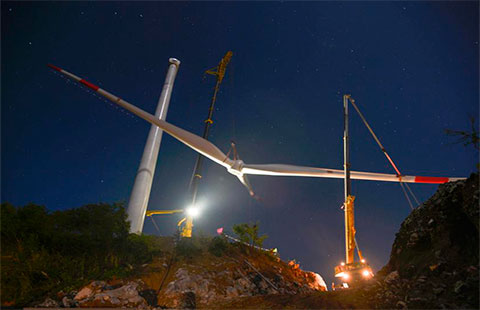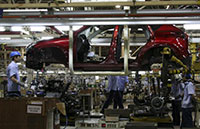

Overcoming the debt crisis haunting Europe is not a matter of months, but of years - and there are no shortcuts.
The causes of the economic and financial crisis are the massive debts incurred over many years by the crisis countries and their lack of competitiveness. The consistent, long-term continuation of budget consolidation is an indispensable precondition for recovery. That is why the fiscal compact must not be renegotiated now. Budget consolidation is just one pillar holding up strong national economies: growth policy is the other.
Responsibility for new growth lies first and foremost with the member states. They must undertake national structural reforms to restore competitiveness. This includes making social security systems fit for the future, improving access to labor markets, particularly for young people, eradicating moonlighting and making education and research priorities.
The countries of Europe caught up in the maelstrom of the financial crisis have already decided to make important reforms. Given the considerably shrinking economies in some countries, however, the reforms which have now been launched are the only chance to get back on track to sustainable growth. But patience is needed, as it will be a while until the reforms take effect.
In the meantime, we have to do more to boost growth. That's why we want to supplement the fiscal compact with a growth pact for more competitiveness. A European growth pact should contain the following six points:
First, the European Union budget should be consistently oriented toward growth: anyone who wants new stimulus packages financed by yet more borrowing has learnt nothing from the crisis. The European Union must utilize its resources better than before rather than spending more. There is money available for future-oriented tasks. The European Union envisages a budget for 2014 to 2020 of approximately 1 trillion euros ($1.28 trillion). We should concentrate on using this money to promote growth and employment, innovation and competitiveness. At the same time, spending must be more closely monitored than hitherto and linked to quantifiable criteria.
Second, unused EU funds must be activated. Around 80 billion euros from the Structural and Cohesion Funds of the current financial period are still available and have not been allocated to any concrete projects. The European Commission and the member states invest this quickly and effectively in new growth through better competitiveness.
Third, access to capital must be improved. In some countries we are seeing that although governments have embarked on the right course, the banking sector cannot play its part properly because it is burdened with bad loans. So companies are not in a position to make sensible investments that would stimulate growth. With the European Investment Bank, we have an instrument that we can and should use to a greater extent and in a more targeted fashion not least in order to ensure that small and medium-sized businesses have better access to loans.
Fourth, infrastructure projects must be promoted. The banking sector's sluggish "blood supply" is also a problem for larger-scale infrastructure projects in Europe. Our roads and railways, our energy and telecommunication networks are among the European economy's best trump cards. They are an important contributing factor to our standard of living, which can only be secured in a Europe which is continuing to grow closer together. State-of-the-art infrastructure opens up new prospects for growth by making private-sector investment more attractive. We need to mobilize private capital for the cross-border expansion of European infrastructure and look at innovative forms of public-private partnership.
Fifth, we must complete the internal market. Expanding the internal market to cover the digitized economy and e-commerce and strengthening small and medium-sized companies by reducing red tape and ensuring better access to risk capital. For additional growth we also need to strengthen cross-border mobility in Europe. The employment opportunities and thus the future prospects of young people must be the priority.
Sixth, we want to strengthen free trade. Three-quarters of world trade takes place outside the EU. More than 80 percent of global growth is produced outside Europe. The EU must work toward making the Doha Round a success while at the same time concluding more free trade agreements with new and long-established centers of power on the world stage.
New growth can be created without incurring new debt. We Europeans must stand together to overcome the crisis. A new growth pact should be adopted as early as June, at the European Council meeting. If we resolutely pursue consolidation and reform and if we use the possibilities open to us creatively, then the whole of Europe will emerge from the crisis stronger and healthier than it was before. We must show the determination to hold our own as a European cultural community in a globalized world.
The author is the German foreign minister.
(China Daily 05/23/2012 page8)
 New wind power group sprouts up in Chongqing
New wind power group sprouts up in Chongqing
 Top 5 online rumors of latest iPhone
Top 5 online rumors of latest iPhone
 A glimpse of former Shougang industrial site
A glimpse of former Shougang industrial site
 Robot waiter introduced to restaurant in South China
Robot waiter introduced to restaurant in South China
 Qingdao gets ready for huge beer festival in China
Qingdao gets ready for huge beer festival in China
 Top 9 automobile recalls in H1 in China
Top 9 automobile recalls in H1 in China
 Disabled veteran carves out success on Internet
Disabled veteran carves out success on Internet
 Top 10 regions with highest GDP growth
Top 10 regions with highest GDP growth
 Caixin China manufacturing PMI falls to two-year low
Caixin China manufacturing PMI falls to two-year low
 China official manufacturing PMI falls to 50.0 in July, below forecasts
China official manufacturing PMI falls to 50.0 in July, below forecasts